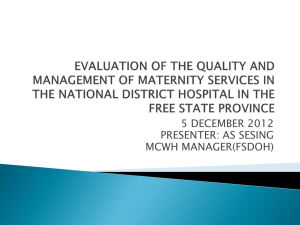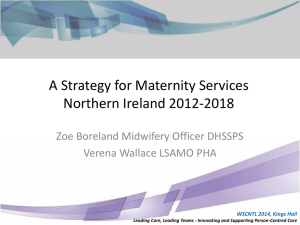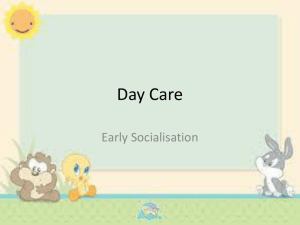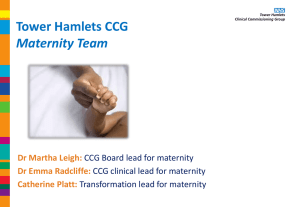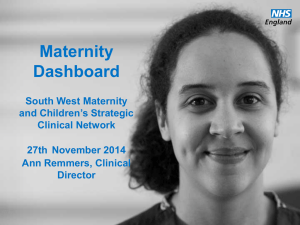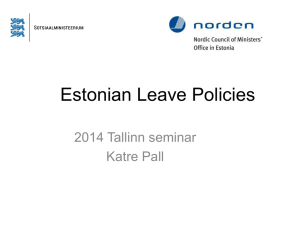Address to Joint Committee on Health and Children
advertisement
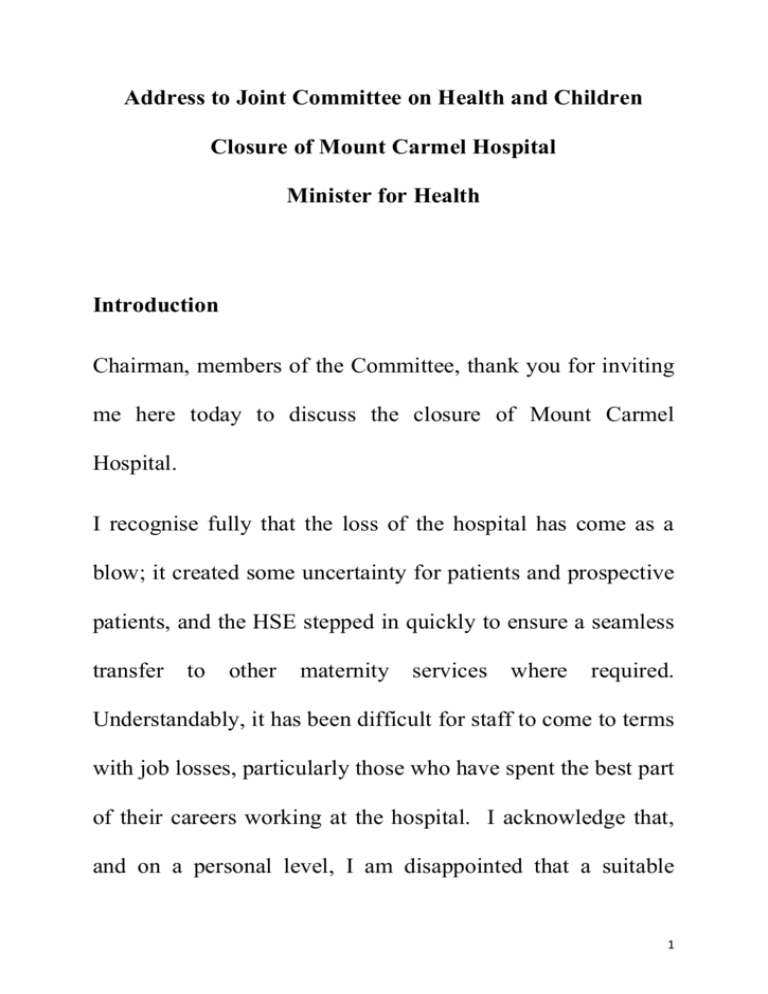
Address to Joint Committee on Health and Children Closure of Mount Carmel Hospital Minister for Health Introduction Chairman, members of the Committee, thank you for inviting me here today to discuss the closure of Mount Carmel Hospital. I recognise fully that the loss of the hospital has come as a blow; it created some uncertainty for patients and prospective patients, and the HSE stepped in quickly to ensure a seamless transfer to other maternity services where required. Understandably, it has been difficult for staff to come to terms with job losses, particularly those who have spent the best part of their careers working at the hospital. I acknowledge that, and on a personal level, I am disappointed that a suitable 1 buyer could not be found for the hospital. However, let me be clear, State purchase of the hospital as a going concern was never a viable option. Government Policy Following an approach from NAMA, my Department undertook a high level examination in order to assess the feasibility of HSE purchase of the Hospital. It immediately became clear that the purchase of Mount Carmel as a standalone, low volume hospital, would be contrary to Government policy on maternity services. Current Government policy on maternity services is based on the premise that for optimal clinical outcomes, maternity services should be co-located with adult acute services, or trilocated with adult and paediatric services. The benefits of colocation and tri-location are very clear. Co-location allows the 2 mother access to a full range of medical and support services should the need arise, for example, cardiac and vascular surgery, intensive care facilities, haematology services, psychiatric services and more. Tri-location ensures immediate access on-site to paediatric services when foetal or neonatal surgery and other interventions are required. The availability of these services helps ensure the delivery of an optimum, safe service for mothers and their babies. I can assure the Committee that Government policy on maternity services is evidence based. The model of standalone maternity hospitals is not the norm internationally, and is no longer recognised as international best practice for future service development. Where other countries have reconfigured, the move has been to co-location and trilocation. In Ireland too, we are moving in that direction. Last May I announced the Government’s intention to relocate the National Maternity Hospital, Holles Street, to the St. 3 Vincent’s University Hospital Campus at Elm Park. We also propose to provide a new maternity hospital on the St James’s campus, alongside the new Children’s Hospital, and thus we will have a tri-located maternity, adult and pediatric facility. In the context of our move to the provision of bi-located and tri-located facilities, the acquisition of Mount Carmel as a stand-alone maternity hospital would,I believe, represent a retrograde step. I should also put on record my reservations regarding the low volume of births in the hospital. Best practice, and the development of excellence in patient care and safety, is predicated on a high volume of patient throughput. On the international front, there has been a clear move to close smaller maternity units and consolidate services into larger hospitals. 4 As a doctor and as Minister for Health, my primary concern must be the provision of safe, high quality care to patients. Chairman, I can assure you that the provision of maternity services in a small, stand-alone maternity hospital, or in a maternity unit within a non- acute setting, does not constitute best practice nor does it represent safest practice, and clearly does not provide the level of safety and quality that our patients need. Birth rates In considering the option to purchase Mount Carmel as a going concern, my officials examined the potential impact of the closure of the hospital on maternity service capacity in the Dublin area. The reality is that there has been a significant reduction in birth rates in Dublin, and indeed in the rest of the country, in recent years. It is also relevant that the CSO 5 projects that birth rates will continue to fall at least until the early 2020s. The latest draft information available from the HSE indicates that there were 25,877 births in the 3 Dublin publicy funded hospitals in 2013. Since the peak in Dublin in 2010, the number of births in Dublin public hospitals has reduced by over 1,900 births. In Mount Carmel in 2012, the most recent full year for which figures are available, there were 1,323 births; some of these from outside the Dublin area. Thus, I think we can be confident that our maternity services have the capacity to deal with the additional demands on their services arising from the closure of Mount Carmel. This is borne out by the fact that within hours of the announcement regarding the liquidation of Mount Carmel, the three Dublin Maternity Hospitals made it clear that they had the capacity to treat maternity patients who had planned to give birth in Mount 6 Carmel, and invited mothers to be to contact them to arrange their transfers. Funding As Government Minister I have responsibilities to the taxpayer to ensure that public money is used prudently. In view of the evidence of falling birth rates and consequently falling demand for maternity services, allied to the need to provide maternity services, where possible, in co- or trilocated hospitals, I am firmly of the view that the purchase of Mount Carmel as a going concern cannot be justified. Any available funding would be more appropriately used to resource our current maternity services to enable them to continue to provide safe, high quality services, rather than acquire a facility, the operation of which would be contrary to Government policy. 7 There may of course be other potential uses for the hospital e.g. as a step down facility or as a short term transitional facility for older persons, and these options may be worth exploring. However, if we want to acquire the hospital for other such purposes, it would not make sense to purchase the hospital as a going concern, as by so doing, we expose the HSE to all contingent liabilities. National Maternity Strategy I would like to inform the Committee that my Department, in conjunction with the HSE, is currently developing a National Maternity Strategy. The Strategy will provide the strategic direction for the optimal development of our maternity services to ensure that women have access to safe, high quality maternity care in a setting most appropriate to their needs. Developing the strategy will provide us with the opportunity to take stock of current services and identify how 8 we can improve the quality and safety of care provided to pregnant women and their babies. The Strategy will ensure that in the future our services are fit for purpose and in accordance with best available national and international evidence. I believe that it would be unwise in advance of considerations regarding the future models of maternity service provision, to make any decisions in relation to maternity service capacity in any part of the country. Conclusion I am aware that the HSE is continuing to work with the Mount Carmel hospital to ensure the seamless transfer of patients to alternative hospitals. We will also, of course, endeavour to support staff in their efforts to find alternative employment. In that regard I am pleased to note that some of the staff have already been offered employment in other hospitals. 9 In conclusion Chairman, I acknowledge that there has been much commentary regarding the closure of Mount Carmel Hospital. I know the hospital holds a special place in the hearts of many people, particularly those who have had babies there, and they are understandably sad that the hospital has closed. However, in considering the option to purchase the hospital, I had to make an evidence based decision. The position is that the acquisition of Mount Carmel as a standalone, low volume maternity hospital would not be in line with current policy in relation to safe and high quality maternity services, and in viewof our falling birthrates, there is no evidence of a need to acquire additional service capacity.Buying the hospital as a going concern would therefore have unnecessarily exposed the HSE and the State to very obvious and significant financial risks. I am satisfied that we have taken the right decision, and we have taken it for the right reasons. 10 End 11
